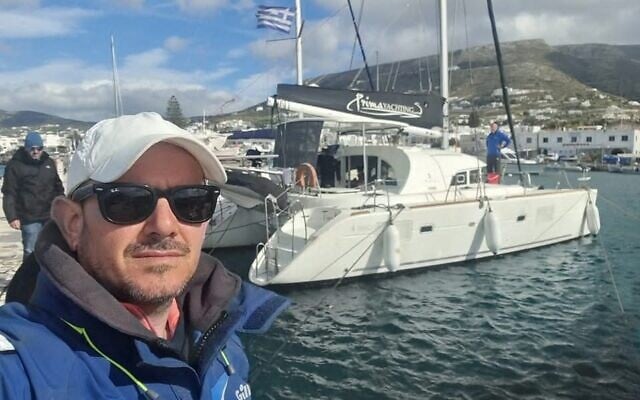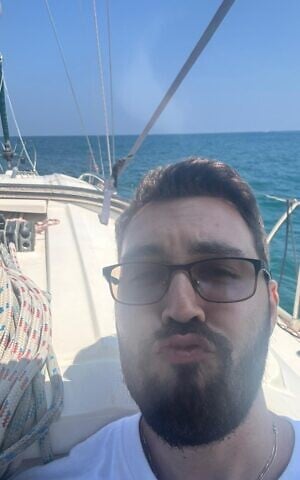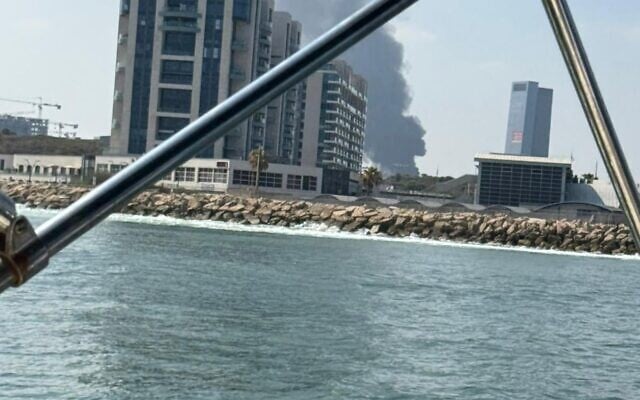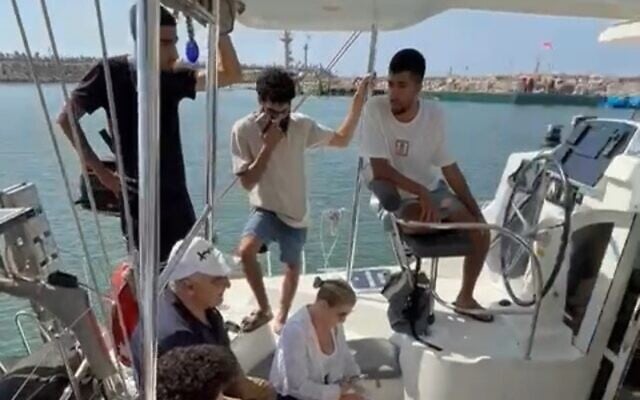


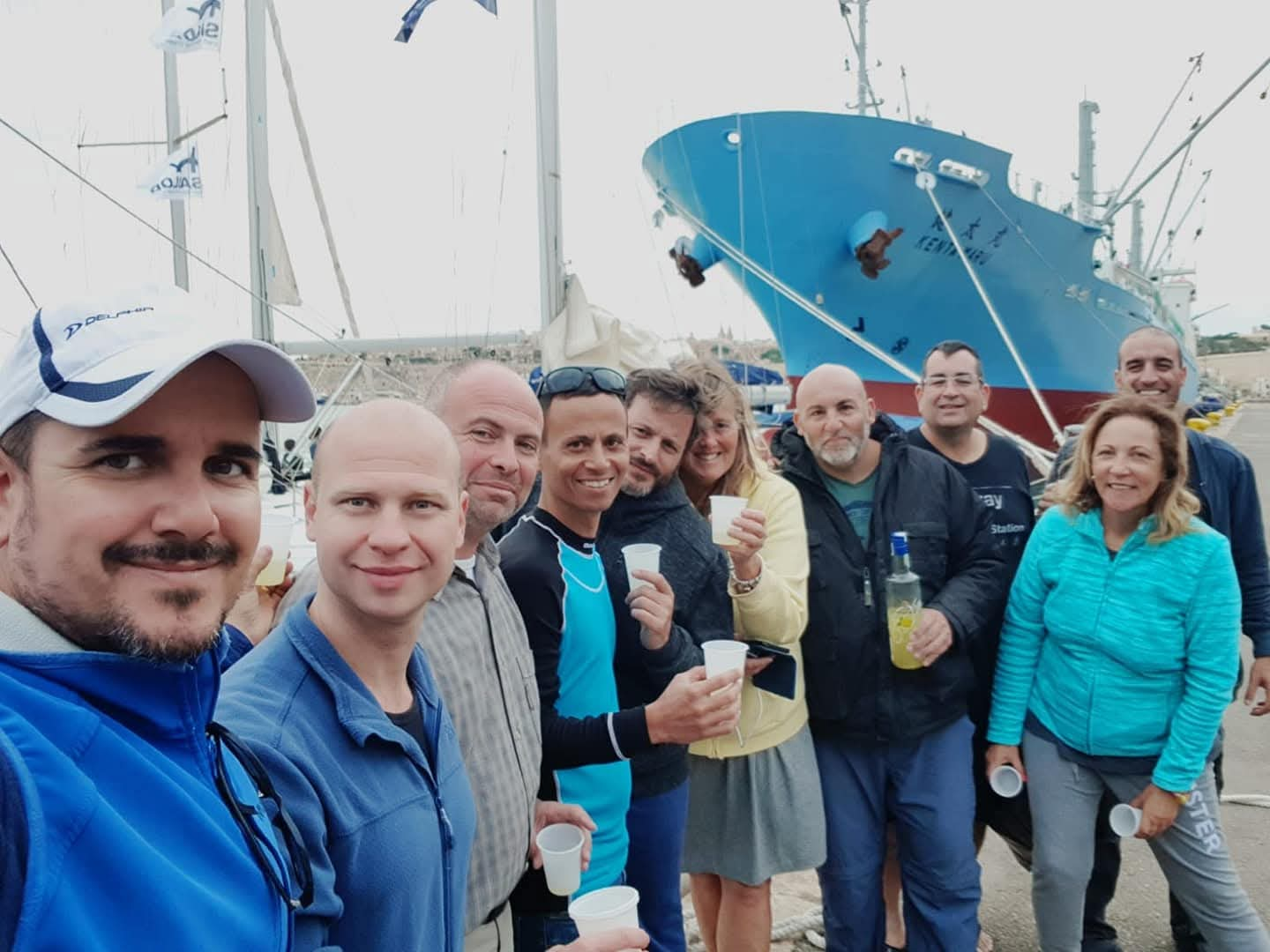
Amit Hari’s phone has not stopped ringing since Israel closed its airspace on Friday after a surprise attack on Iranian nuclear and military sites, leaving more than 100,000 Israelis stranded abroad and tens of thousands of tourists stuck in the country with very few options for returning home.
Hari, who is a licensed captain and the owner of the Sailor Yacht Club in Herzliya, said he has been receiving thousands of calls from Israelis desperately seeking an avenue to return home from Cyprus, as well as from foreigners, tourists, and Israelis living abroad who are eager to get out of Israel.
“I told my wife I feel like Schindler, I have a notebook here with lists, and basically, I’m trying to help anyone that I can who wants to come with us on our yachts to Larnaca and anyone who wants to return with us to the port of Herzliya,” Hari told The Times of Israel.
“I have a few cases where I reserve places for people with special needs — for example, this week I’m bringing in from Larnaca an Israeli passenger suffering from cancer who needs to return to receive a special treatment at the Ichilov hospital which he can’t receive anywhere else in the world because it’s experimental,” he said.
“I was willing to potentially lose the slot — as he wasn’t sure about taking the journey — just to make sure he arrived in Israel to get his treatment. This is just one story among a lot,” Hari said.
Hari says his yacht club is operating three 40-foot yachts from the port of Herzliya to the port of Larnaca that can take up to seven passengers at a time with their luggage. He described the boat as akin to a “caravan on the water,” which offers three or four double cabins depending on the model, a shared toilet and shower, and a small kitchen.
“Since Sunday, we have done three sailing trips, taking with us either foreigners who got stuck here due to the situation here, Israelis who live abroad and need to get home, and Israelis who want to flee from here,” Hari said.
“It is not an easy trip of 30 hours on a yacht with people who are not used to sailing. It can be very challenging for them,” he cautioned.
Israel’s airspace has been closed for departures and arrivals since Friday, and as Iranian missiles continue to rain down, it is not known when regular commercial flights may resume. On Wednesday, Israel launched a repatriation operation together with local airlines that is expected to take weeks.
Hundreds stranded abroad and in Israel have headed online, seeking maritime travel solutions via social media channels. On Facebook, people have opened multiple groups dedicated to finding sea-based travel options — mainly out of Israeli ports in Herzliya and Haifa — but prices have steepened as demand shot up.
Hari said the prices of a voyage to or from Cyprus are “crazy,” ranging from around NIS 2,000 ($572) per person for lower-end tickets to a staggering NIS 80,000 ($23,000) for faster luxury motor yachts.
“NIS 2,000 buys you a place, or a seat in a small ferry that takes between 20 and 50 people, like in a floating bus,” said Hari. “We charge NIS 6,000 [$1,700] per person, and in normal times we charge about NIS 4,500 [$1,300] for a Cyprus trip, so the price went up a bit because we are leaving our families here and there is a certain risk we are taking as well.”
Hari added that he is currently arranging sailing trips three days in advance due to the uncertain security situation, adding that his yachts to Larnaca are fully booked back and forth until Friday.
On Tuesday morning, Israeli-American Tamir Levaton, 23, was waiting for a small yacht to set sail at the Herzliya harbor to take him and four other passengers to Larnaca when he heard air raid sirens going off.
“I started panicking, and the captain said we can either try to run to a nearby hotel that has a shelter or stay on the boat and hopefully missiles won’t get too close,” Levaton said. “I stayed on the boat, as I didn’t want to risk running out as I could hear the rockets overhead and hoped we don’t get hit.”
Iran fired a barrage of missiles at Israel on Tuesday morning, some of which slammed into central areas of the country, including the city of Herzliya. Reports indicated that one missile hit a storage shed near Herzliya, setting it on fire, and another hit a parking lot, where an empty bus went up in flames, lightly hurting several people.
Levaton arrived in Israel in early June to visit family and friends, and had a ticket to fly back to Las Vegas with El Al on June 18.
“When all flights were canceled up until June 23, I understood that I got stuck,” said Levaton. “And it didn’t help that I’m supposed to be moving in a couple weeks and I have job interviews, so I had to postpone those as I tried to find alternate routes to get back.”
Levaton said that in the first couple of days, the land border gateway, which has remained open, appeared to be the only option for him to leave Israel — via Jordan. But then, with the help of family and friends and a search on social media channels and Facebook groups, he was lucky to find a different way to get out of Israel.
“Monday night, I got a call about an opening on a sailing boat leaving in the morning to Cyprus because a couple had canceled last minute and it was posted on Facebook, so I was able to jump in and snag their spot,” said Levaton. “It’s five of us and two skippers on the sailing boat that has three or four beds and we just take turns sleeping.”
Levaton said the privately chartered 30-hour voyage cost NIS 1,500 ($430).
“It could have been NIS 5,000, but it is still a dent,” said Levaton. “From Larnaca, the plan is to fly to somewhere in Europe, and then to the US.”
American-born Israeli Yaakov Katz was on a flight from London to Tel Aviv on Thursday night, set to land at 3:30 a.m. at Ben Gurion Airport — shortly after Israel launched its surprise attack.
“Minutes from landing, we were suddenly diverted to Cyprus and stayed on the plane for a few hours,” Katz, a former journalist and author of several books, including “While Israel Slept” about the October 7, 2023, Hamas invasion, wrote on X.
“For two days I was stranded in Paphos, but everywhere I went — from the streets to the hotel to the Chabad House that opened its doors within hours — I met Israelis who had one goal: get back home. Not to safety. To Israel,” he wrote.
Katz started working on finding ways to get back to Israel, but the options were very limited. Initially, he explored the options of flying to the Egyptian coastal resort of Sharm el-Sheikh or to Amman in Jordan and entering Israel via land border crossings. Then on Sunday night, while seeking boat travel options, he got a call to be in Limassol within an hour as a tugboat was leaving for Israel, charging NIS 6,000 ($1,700) for the trip.
“Nine of us squeezed onto a vessel captained by Eli, a veteran Israeli sailor who didn’t ask questions — just took the wheel,” Katz said on social media.
“Among us: a brother and sister who are farmers and grow flowers in the Arava. They’d been in Holland on a sales trip. The brother insisted on returning to report for reserves. Another was a CEO from Karmiel. His company has 100 employees and global orders he’s now fighting to fulfill despite a country under fire.”
“No one asked if it was safe,” he wrote. “But that’s not how Israelis think.”

